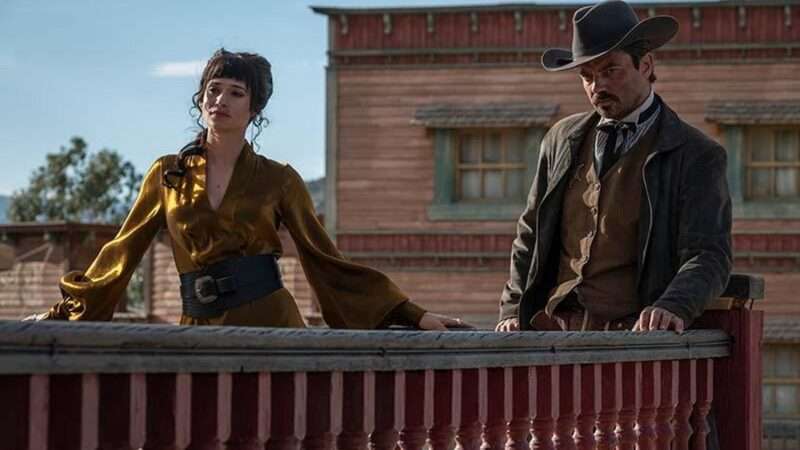
That Dirty Black Bag. Available now on AMC+.
A lot of stuff from the 1960s—hippie communes, Tab, bubble-gum music—hasn't aged particularly well. To that list, it's time to add Spaghetti Westerns, what was at that time a sardonic new breed of horse operas spearheaded by Italian director Sergio Leone and his favorite leading man, Clint Eastwood.
When they burst on the scene in 1964, the Spaghetti Westerns revivified a dying American film genre with their lone, laconic gunslingers; hair-trigger violence; and whiplash editing that bounced from spectacular location photography (no dreary, weary old backlots) to extreme close-ups of not-necessarily-very-pretty actors.
But watch Spaghetti Westerns today—TCM runs them constantly—and they seem mostly witless (Leone and many of his imitators couldn't write in English), badly dubbed and thinly plotted. The editing style they pioneered has become so ubiquitous that it's no longer very noticeable. The indifferent cynicism of their characters seems more a pose than an attribute.
All this is by way of saying that The Dirty Black Bag, the new Spaghetti Western on the streaming service AMC+, is an anachronistic bore. Yes, Italy, Spain, and Morocco, where the series was shot, have some ruggedly picturesque territory that looks just like the old American West for which it stands in. Yes, Dominic Cooper and Douglas Booth look menacing, especially if they've got a bloody axe in one hand and the body of a naughty 14-year-old at their feet. So what? You need more than that to make up for a garbled story and dullard dialogue. Listlessly moping around the tumbleweeds, even when punctuated by the occasional disembowelment, is not a plot-driver.
Written and directed by Italian TV regular Mauro Aragoni, The Dirty Black Bag exhibits faithful adherence to the Spaghetti Western playbook. (In some case, shot by shot; a scene of a bored gunfighter trapping a fly inside the barrel of his revolver is lifted—excuse me, "homaged"—right out of Leone's 1968 Once Upon a Time in the West.) Aragoni sets a bunch of grim-faced, itchy-trigger-fingered characters wandering in seemingly unrelated directions, then stands back when they converge and the blood splatters.
Most of the action takes place around the once-booming town of Greenvale, where the vein of gold ore that brought prosperity has been exhausted and a five-year drought has laid waste to all the farms that supplied stability. Such authority as exists in the vacant, vagrant Greenvale is vested in the prickly sheriff, Arthur McCoy (played by Cooper, late of Preacher), who seems curiously indifferent to crimes committed against his constituents: When a farmer complains that his plowhorses have been stolen by the town bad boys, the sheriff advises him to sell the place and move on.
Sheriff McCoy, however, is concerned about a bounty hunter passing through his jurisdiction, the grizzled and grisly Red Bill (Booth, of The Pillars of the Earth), a quick man with both a gun and a hatchet. The latter is to decapitate his targets and bring in their heads to collect his rewards. "A head weighs less than a body," the practical-minded Red Bill notes as he deposits the heads in that titular dirty black bag. The sheriff's pique at Red Bill is unexplained; could it have something to do with those three broad, shiny scars running down his back?
The farmer whose missing plowhorses matter so little to Sheriff McCoy is Steve (Christian Cooke, Magic City), who is dead-solid certain God wants him to keep farming near Greenvale despite that five-year drought. His none-too-scrupulous opponents in this undertaking are the extortionate land baron Mr. Thompson (British TV star Paterson Joseph), who is convinced gold still lies beneath the town, and the whore-with-a-heart-of-wooden-nickels Eve (Niv Sultan, Tehran), who is certain that her burnt-out old romance with Steve would rekindle if he'd just leave his wife and the farm.
The wild card in all this is Butler (Aidan Gillen, Game of Thrones), an innocent-looking goat farmer whose mild exterior conceals his maniacal religious zealotry. Butler follows the Gospel as it might have been preached by Hannibal Lecter. "This is Hell, and we are the demons," he advises a potential parishioner he's evangelizing with a meat hook.
This all sounds rather more interesting than it is. The motives and agendas of the characters take far too long to emerge, and often, when the characters are seen in underlit or distant camera angles (as they often are, just to remind you that they're up to dark doings, as if the pyramid of empty-eyed skulls in the background aren't enough of a clue), it's impossible to tell who they even are, since everybody is submerged in frontier facial hair and pretty much all conversation concerns the finer points of murder and rape. I'd guess that the show's scripts contain a lot of descriptive notes that read only, "GUY bloodily kills OTHER GUY."
With the storyline frequently repetitious and almost entirely incomprehensible, it seems that only headhunters and professional sadists will likely manage to maintain long-term interest in That Dirty Black Bag. (Though, to be fair, those are important Nielsen demographics.) I spent more time pondering Farmer Steve's theology than who was killing who. Asked what makes him think that God is really watching over sun-baked, corpse-strewn Greenvale, he replies: "God is wherever suffering is." Is that cause, Steve, or effect?
The post <em>That Dirty Black Bag</em> Shows Exactly Why Spaghetti Westerns Died appeared first on Reason.com.






